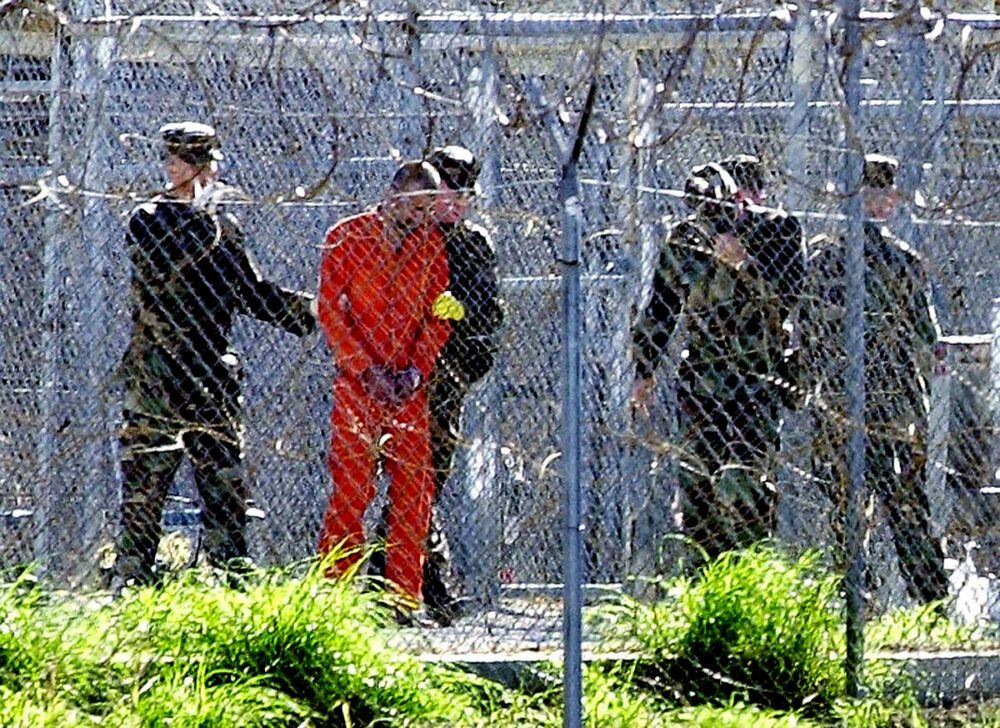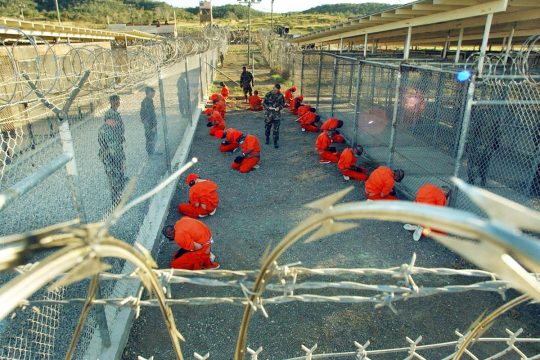“A reckoning is long overdue. US double standards in not accepting the international rule of law erodes the enforcement of the law everywhere and undermines the credibility and legitimacy of the global order designed to protect all humanity,” said Ben Saul, UN Special Rapporteur on human rights and countering terrorism, in a press release on September 11 this year, anniversary of the 9/11 attacks in New York and Washington by Al-Qaeda in 2001. He was referring to the situation in the US military prison at Guantanamo Bay, on the island of Cuba.
Two-thirds of the original Guantánamo detainees were clearly not charged with anything, and were recommended for transfer to third countries. According to Saul in his press release, “many of the approximately 741 people released from detention at Guantánamo Bay, including foreign nationals resettled in 29 third countries, faced acute vulnerabilities and have not had adequate, sustained support to recover from the trauma suffered from torture and protracted, inhumane detention. Some were arbitrarily detained, tortured, or were abusively charged with crimes upon arrival in other countries”.
Thirty detainees remain in the Guantánamo prison. In August, the current administration of outgoing US President Joe Biden reneged on a previously agreed plea deal in which three defendants in Guantánamo accused of participating in the preparation of the 9/11 attacks agreed to plead guilty to the conspiracy charges against them in exchange for a life sentence, instead of a potential death sentence. This U-turn was apparently because of pressure from families of 9/11 victims and members of the Republican Party.
According to Saul, the conditions of detention for the remaining 30 detainees in Guantánamo “do not appear to meet international standards, including in relation to medical care, torture and trauma rehabilitation, access to lawyers, and family visitation”. He added that “sixteen of the remaining detainees have been cleared for release and await resettlement abroad, after decades in detention without charge”.
Al-Nashiri: tortured and detained 22 years without trial
Sylvain Savolainen, a Swiss lawyer for Guantánamo detainee Abd al-Rahim al-Nashiri, describes the torture inflicted on his client: “As well as waterboarding, the torture meant: simulated executions; the notorious rectal feeding – it is in fact rape via the anus; being suspended naked in the basement with his wrists tied behind his back, to the point that his shoulder was dislocated; having his head hit against the walls; depriving him of sleep for more than ten days; and putting him in a box where he did not have enough room to place his feet -- he had to be on tiptoe in a black box with insects.”
As Savolainen points out, these “enhanced interrogation techniques” have been extensively documented by UN and European human rights bodies and also by public, credible sources in the US itself, notably a December 2014 Senate intelligence committee report into CIA interrogation techniques post-9/11. The torture is described in a November 2022 Opinion of the UN Working Group on Arbitrary Detention, which said al-Nashiri should be immediately released and compensated for the grave psychological and physical torture he has suffered. That decision is addressed not only to the US but also governments of other countries where he was abused. They include Lithuania, Morocco, Poland, Romania and Thailand, where he is reported to have been tortured at CIA “black sites” under George W. Bush’s so-called “renditions” policy from 2002 to 2006. He was transferred to the Guantánamo Bay US military prison in 2006.
Al-Nashiri, a Saudi Arabian citizen the US suspects of masterminding the 2000 bombing of the USS Cole in which 17 US Navy sailors were killed and 37 injured, was captured in Dubai, United Arab Emirates, in November 2002. He is charged in connection with the USS Cole bombing and has been in pre-trial hearings before a US military court in Guantánamo for 13 years. Savolainen is working with a group of lawyers to bring his case for release and reparation before UN and European human rights bodies.
“This is no justice”
In August 2023, the military court in Guantánamo threw out evidence against al-Nashiri obtained under torture. This decision came not long after the UN Working Group on Arbitrary Detention’s Opinion was made public and a damning report by former UN Special Rapporteur on human rights and counter-terrorism Fionnuala Ní Aoláin, who was allowed by the Biden administration to visit Guantánamo. She concluded that the US policy of torture remains the greatest obstacle to justice for both 9/11 victims and alleged perpetrators in Guantánamo. “The totality of these practices and omissions have cumulative, compounding effects on detainees’ dignity and fundamental rights, and amounts to ongoing cruel, inhuman, and degrading treatment,” she concluded. “Closure of the facility remains a priority.”
Ní Aoláin’s report says that “nine men involved in the military commission [Guantánamo military court] process are still in the pre-trial phase after experiencing countless delays”. She further pointed to “fundamental fair trial and due process deficiencies in the military commission system”.
Savolainen thinks the US military court “is no justice”. “Fair justice is no longer possible,” he told Justice Info. “A trial is no longer possible, that’s what the decision [of the UN Working Group on Arbitrary Detention] says, because the effects of torture on the individual are so violent. That is why – and the UN says so – he should be freed immediately.”
This echoes the findings of Ní Aoláin, who concluded that, given the effects of torture and prolonged violation of their rights, “it is highly unlikely that any detainee can effectively assist with and participate in their own defence”. She reiterates the call of UN and other human rights bodies that the remaining detainees in Guantánamo be released and compensated for the abuses they have suffered.
Abu Zubaydah: tortured and held indefinitely without charge
Abu Zubaydah, a Palestinian citizen born in Saudi Arabia, was the CIA’s first detainee post-9/11. Captured in Pakistan in 2022, he was held at various CIA black sites and transferred in 2006 to Guantánamo. He has never been charged but, unlike 16 other current detainees, he has not been cleared for transfer to a third country. Reports of his extreme torture under “enhanced interrogation techniques” are similar to those concerning al-Nashiri. Hannah Garry, a US lawyer helping to represent Abu Zubaydah before UN and other human rights and justice bodies, says her client has suffered “horrific physical and psychological damage” as a result of his prolonged arbitrary detention and torture.
The UN Working Group on Arbitrary Detention says, in an Opinion released in April 2023, that “taking into account all the circumstances of the case, the appropriate remedy would be to release Mr. Zubaydah immediately and accord him an enforceable right to compensation and other reparations, in accordance with international law”. The US initially suspected him of being a key terrorist threat and a “member of Usama bin Laden’s inner circle”, but the UN working group says “these assertions were allegedly based on torture-induced information, which was recanted in 2002”. Its report also points out that “in February 2008, the Government of the United States conceded that Mr. Zubaydah was not a member of Al-Qaida. In 2017, he was removed from the Al-Qaida sanctions list. Despite the basis for his detention having been discredited, the Government continues to assert its right to detain him indefinitely”.
So how is it possible to continue detaining him? “It’s under an interpretation of US law on authorization and use of military force if he has been detained and determined to be – which he was – an enemy combatant,” Garry told Justice Info. “I am not saying this is a right interpretation. This is their interpretation that as long as there’s an ongoing security threat in this ongoing ‘war’ – quote, unquote – there is a right to hold him indefinitely.”
She says his lawyers have been contacting countries that would potentially be willing to host him if he is cleared for transfer. But this is not easy in the current context of the Middle East conflict. The US stalled the planned transfer of 11 Yemeni detainees to Oman after the Hamas attack on Israel on October 7 last year. The war in Gaza, in which Yemen’s Houthis have also become involved, has raised concerns about security not only of detainees but also the US, says Garry.
Pushing for justice and reparations
Lawyers for Guantánamo detainees have brought many cases before UN and European human rights bodies. These include UN Special Rapporteurs, the UN Working Group on Arbitrary Detention, the UN Human Rights Committee and the European Court of Human Rights (ECHR). The ECHR has issued rulings against European countries like Poland, Romania and Lithuania that hosted US “black sites” where detainees were subjected to CIA torture. Some detainees have also been recognized as torture victims before the International Criminal Court (ICC) in the Afghanistan situation, including al-Nashiri and Abu Zubaydah, according to their lawyers.
In the UK, there is a related case ongoing before the Investigatory Powers Tribunal. The UK is accused of complicity in the US renditions and torture. This is also raised in the UN Working Group on Arbitrary Detention’s Opinion concerning Abu Zubaydah. “In a 2010 United Nations joint study, the United Kingdom was identified as a State complicit in the extraordinary rendition programme that knowingly took advantage of it,” it says. “The Intelligence and Security Committee of Parliament (United Kingdom) found, in 2018, that the Government had sent questions to interrogators and received intelligence obtained from detainees who the authorities knew or should have known had been mistreated.” In addition, “a report of the European Parliament cites 170 stopovers by aircraft operated by the Central Intelligence Agency at airports in the United Kingdom” taking detainees to rendition sites.
Lawyers are pushing for their clients to be released and granted reparations, as many human rights bodies have recommended. Reparations, according to Garry, should include “all of the possible reparations for effective remedy under international law”. She cites the right to truth, with investigations and transparency about what happened; apology; release from detention; compensation for torture, rehabilitation and medical care.
There is also a push for the US perpetrators of torture to be brought to justice. The UN Working Group in its decision relating to al-Nashiri concluded in particular by urging governments to ensure a full and independent investigation and take appropriate measures against those responsible for the violation of al-Nashiri’s rights. The investigations of the ICC in the Afghanistan situation aim for the same as regards US military personnel and medics who authorized and carried out torture.
What’s next?
“We know what Trump’s position on Guantánamo has been under his previous administration. There are no plans to close it down for sure, and the plans are to keep it open as this sort of no-man’s land, a kind of lawless place for holding the ‘bad guys’,” says US lawyer Garry. “With Harris, I think it’s very tricky for her with all of what’s happened with Gaza and given the polarized state of the US population at the moment between the two parties. My sense is it’s a no-win situation to even bring it up.”
But both Garry and Savolainen agree the Biden-Harris government, while failing to close Guantánamo, have made progress on freeing detainees. They also point to the administration’s invitation to former UN Special Rapporteur on human rights and counterterrorism Ní Aoláin to visit the Guantánamo Bay prison, which Ní Aoláin also hailed as courageous. They say closing Guantánamo should be a priority for the next US administration, not only for the sake of the detainees but also US credibility on human rights and upholding international law.
“It’s an extremely difficult process with the release,” says Garry, “and it’s unfortunately a self-inflicted wound by the US government. I think it is imperative that the US government move forward on rehabilitating its record with regard to torture, releasing the detainees and just acknowledging and apologizing for what they have done.”
Savolainen agrees: “If Guantánamo were a judicially legitimate institution there would be no need to close it. They want to close it because they are aware of the problem it represents, notably with regard to US credibility with interlocutors like China, Russia and others when human rights are discussed. It happens regularly that when human rights issues are raised, the US is told you have no credibility on this, close Guantánamo and then come and talk to us.”








